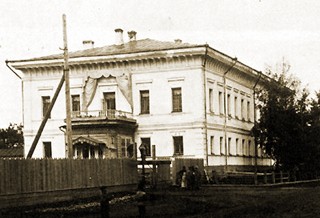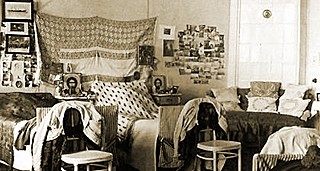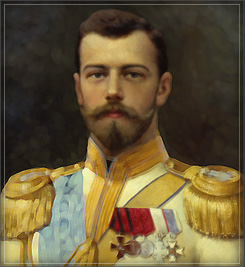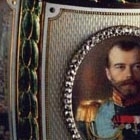Bob Atchison's guide to rare and antique roses and where to buy them with special focus on David Austin Roses and Antique Rose Emporium



Captivity at Tobolsk - Pierre Gilliard - Thirteen Years at the Russian Court
AUGUST-DECEMBER, 1917
What reasons had the Council of Ministers for transporting the Imperial family to Tobolsk?
It is difficult to say definitely. When Kerensky told the Tsar of the proposed transfer he explained the necessity by saying that the Provisional Government had resolved to take energetic measures against the Bolsheviks; this would result in a period of disturbance and armed conflict of which the Imperial family might be the first victims; it was therefore s duty to put them out of danger. It has been claimed in other quarters that it was an act of weakness in face of the extremists, who, uneasy at seeing in the army the beginnings a movement in favour of the Tsar, demanded his exile to Siberia. However this may be, the journey of the Imperial family from Tsarskoe-Selo to Tobolsk was effected under comfortable conditions and without any noteworthy incidents
Leaving on August 14th at 6 a.m., we reached Tyumen - nearest railway station to Tobolsk - on the evening of the 17th, and a few hours later boarded the Russ.
On the following day we passed the native village of Rasputin, and the family, gathered on the deck, were able to observe the house of the staretz, which stood out clearly from among the isbas. There was nothing to surprise them in this event, for Rasputin had foretold that it would be so, and chance once more seemed to confirm his prophetic words.
On the 19th, towards the end of the afternoon, we suddenly saw at a bend in the river the crenelated silhouette of the Kremlin, which dominates Tobolsk, and an hour later we reached our destination.
The house which was to receive us not being ready, we were forced to remain for some days on the boat which had brought us, and it was not until August 26th that we moved into our new quarters.

Above; the Governor's Mansion in Tobolsk.
The family occupied the whole of the first floor of the Governor's house, a spacious and comfortable building. The suite lived in Kornilov's house, belonging to a rich merchant of Tobolsk, and situated on the other side of the road almost facing ours. The guard was formed by soldiers of the former rifle regiments of the Imperial family who had come with us from Tsarskoe-Selo. They were under the orders of Colonel Kobylinsky, a generous man who had become sincerely attached to those in his charge; he did all he could to ameliorate their lot.
At first the conditions of our captivity were very similar to those at Tsarskoe-Selo. We had all that was necessary. The Tsar and children nevertheless suffered from lack of space. Their exercise was confined to a very small kitchen garden and a yard which had been formed by enclosing with a fence a broad and little-frequented street running along the south-east side of the house in which they lived. It was very little, and they were exposed to the observation of the soldiers, whose barracks overlooked the whole of the space reserved for us. On the other hand, the members of the suite and servants were freer than at Tsarskoe-Selo, at any rate to begin with, and were allowed to go into the town or immediate surroundings. In September Commissary Pankratov arrived at Tobolsk, having been sent by Kerensky. He was accompanied by his deputy, Nikolsky - like himself, an old political exile. Pankratov was quite a well-informed man, of gentle character, the typical enlightened fanatic. He made a good impression on the Tsar and subsequently became attached to the children. But Nikolsky was a low type, whose conduct was most brutal. Narrow and stubborn, he applied his whole mind to the daily invention of fresh annoyances. Immediately after his arrival he demanded of Colonel Kobylinsky that we should be forced to have our photographs taken. When the latter objected that this was superfluous, since all the soldiers knew us - they were the same as had guarded us at Tsarskoe-Selo - he replied: "It was forced on us in the old days, now it's their turn." It had to be done, and henceforward we had to carry our identity cards with a photograph and identity number.

Above; the bedroom of the Grand-Duchesses in Tobolsk.
The religious services were at first held in the house, in the large hall on the first floor. The priest of the Church of the Annunciation, his deacon, and four nuns from the Ivanovsky Convent, were authorized to attend the services. As, however, there was no consecrated altar, it was impossible to celebrate Mass. This was a great privation for the family.
Finally, on September 21st, the festival of the Nativity of the Virgin, the prisoners were allowed for the first time to go to the church. This pleased them greatly, but the consolation was Only to be repeated very rarely. On these occasions we rose very early and, when everyone had collected in the yard, went out through a little gate leading on to the public garden; which we crossed between two lines of soldiers. We always attended the first Mass of the morning, and were almost alone in the church, which was dimly lighted by a few candles; the public was rigorously excluded. While going and returning I have often seen people cross themselves or fall on their knees as Their Majesties passed. On the whole, the inhabitants of Tobolsk were still very attached to the Imperial family, and our guards had repeatedly to intervene to prevent them standing under the windows or removing their hats and crossing themselves as they passed the house.
Meanwhile our life gradually settled down along definite lines, and by mobilising all our resources we managed to resume the education of the Tsarevich and two youngest Grand-Duchesses. The lessons began at nine o'clock, and were broken off from eleven to twelve for a walk, which was always shared by the Tsar. As there was no schoolroom, the lessons were given sometimes in the large hall on the first floor, sometimes in Aleksey Nicolaievich's room, or mine. I lived on the ground floor in what had been the Governor's study. At one o'clock we all assembled for lunch. The Tsarina, when she was not well, often took her meals in her own apartments with Aleksey Nicolaievich. About two o'clock we used to go out again and walk about or play until four.
The Tsar was suffering a great deal from lack of physical exercise. Colonel Kobylinsky, to whom he complained of this, had beech-trunks brought and bought some saws and axes, and we were able to cut the wood we required for the kitchen and stoves. This was one of our great outdoor distractions during our captivity at Tobolsk, even the Grand-Duchesses becoming very keen on this new pastime.
After tea, lessons were resumed until about half-past six. Dinner was an hour later, after which we went up to the large hall for coffee. We had all been invited to spend the evening with the family, and this soon became a regular habit for several of us. Games were organized and ingenuity shown in finding amusements to break the monotony of our captivity. When it began to get very cold, and the large hall became impossible, we took refuge in the adjoining room, which was Their Majesties' drawing-room, the only really comfortable apartment in the house The Tsar would often read aloud while the Grand-Duchesses did needlework or played with us. The Tsarina regularly played one or two games of bezique with General Tatichtchev and then took up her work or reclined in her armchair. In this atmosphere of family peace we passed the long winter evenings, lost in the immensity of distant Siberia.
One of the greatest privations during our captivity at Tobolsk was the almost complete absence of news. Letters only reached us very irregularly and after long delay. As for newspapers, we were reduced to a nasty local rag printed on packing paper, which only gave us telegrams several days old and generally distorted and cut down.
The Tsar eagerly followed the development of events in Russia. He realized that the country was rushing towards ruin. He had a moment of fresh hope when General Kornilov offered Kerensky to march on Petrograd to put an end to the Bolshevik agitation, which was becoming more and more menacing. His disappointment was very great when the Provisional Government rejected this final chance of salvation. He saw in this the only means that remained perhaps of avoiding the imminent catastrophe. I then for the first time heard the Tsar regret his abdication. He had made this decision in the hope that those who had wished to get rid of him would be capable of making a success of the war and saving Russia. He had feared that resistance on his part might give rise to a civil war in the presence of the enemy, and had been unwilling that the blood of a single Russian should be shed for him. But had not his departure been almost immediately followed by the appearance of Lenin and his acolytes, the paid agents of Germany, whose criminal propaganda had destroyed the army and corrupted the country? It now gave him pain to see that his renunciation had been in vain, and that by his departure in the interests of his country he had in reality done her an ill turn. This idea was to haunt him more and more, and finally gave rise to grave moral anxiety
About November 15th we learnt that the Provisional Government was overthrown and that the Bolsheviks had again come into power. But this event did not immediately react on our life, and it was not until some months later, as we shall see, that it occurred to them to turn their attention to us.
The weeks passed and the news which reached us grew worse and worse. It was, however, very difficult for us to follow events and grasp their purport, for the information at our disposal did not allow us to understand the causes or calculate the consequences; we were, so far, so isolated from the entire world. And even if we succeeded in getting a rough knowledge of what was happening in Russia, the rest of Europe was almost a closed book
Meanwhile the Bolshevik doctrines had begun their destructive work in the detachment which was guarding us and which hitherto had been fairly proof against them. It was composed of very varied elements: the men of the 1st and 4th Regiments were for the most part favorably disposed towards the Imperial family, and especially towards the children. The Grand-Duchesses, with that simplicity Which was their charm, loved to talk to these men, who seemed to them to be linked with the past in the same way as themselves.
They questioned them about their families, their villages, or the battles in which they had taken part in the great war. Aleksey Nicolaievich, who to them was still "the Heir," had also won their hearts, and they took trouble to please him and find amusements for him. One section of the 4th Regiment, composed almost exclusively of the older classes, was particularly conspicuous in its attachment, and it was always a delight to the family to see these good fellows come back on duty. On these days the Tsar and children used to go secretly to the guardhouse and converse or play draughts with the men, whose conduct was never in a single instance anything but strictly correct. Here they were once surprised by Commissary Pankratov, who stood astounded on the doorstep, looking through his spectacles at this unexpected sight. The Tsar, seeing his disconcerted appearance, motioned to him to come and sit at the table. But the Commissary evidently thought he was out of place; muttering a few unintelligible words, he turned on his heel and fled, discomfited.
Pankratov, as I have said, was a fanatic imbued with humanitarian principles; he was not a bad fellow. Immediately after his arrival he had organized classes for the soldiers to initiate them in Liberal doctrines, and did all he could to develop their patriotism and citizenship. But his efforts recoiled upon himself. A convinced adversary of the Bolsheviks, he was in reality merely preparing the ground for them and, without realising it, helping towards the success of their ideas. As will be seen, he was destined to be the first victim.
The men of the 2nd Regiment had from the outset been distinguished by revolutionary sentiments; at Tsarskoe-Selo they had already been the cause of a good deal of annoyance to their prisoners. The Bolshevik coup d'etat increased their authority and audacity; they had managed to form a "Soldiers' Committee," which tended further to restrict our regime and gradually to substitute its authority for that of Colonel Kobylinsky. We had proof of its ill-will on the occasion of Baroness Buxhoeveden's arrival (the end of December O.S.). She had shared our captivity at Tsarskoe-Selo, and it was only the state of her health that had prevented her from leaving with us. She had no sooner recovered than she came, with Kerensky's permission, to rejoin the Tsarina. The Soldiers' Committee flatly refused to let her enter the house, and she had to find accommodation in the town. This was a great grief to the Tsarina and the whole family, who had been looking forward very impatiently to her arrival.
Thus we reached Christmas.
The Tsarina and Grand-Duchesses had for many weeks been preparing with their own hands a present for each of us and each of the servants. Her Majesty distributed some woollen waistcoats which she had knitted herself. With such touching thoughtfulness as this she tried to show her gratitude to those who had remained faithful.
On December 24th the priest came to the house for Vespers; everyone then assembled in the large hall, and the children were full of delight at the "surprise" prepared for us. We now felt part of one large family; we did our best to forget the preoccupations and distresses of the time in order to enjoy to the full and in complete unity these moments of peaceful intimacy.
The next day, Christmas Day, we went to church. By the orders of the priest the deacon intoned the Mnogoletie (the prayer for the long life of the Imperial family) This was an imprudence which was bound to bring reprisals. The soldiers, with threats of death, demanded that the prayer should be revoked. This incident marred the pleasant memories which this day should have left in our minds. It also brought us fresh annoyances and the supervision became still stricter.







